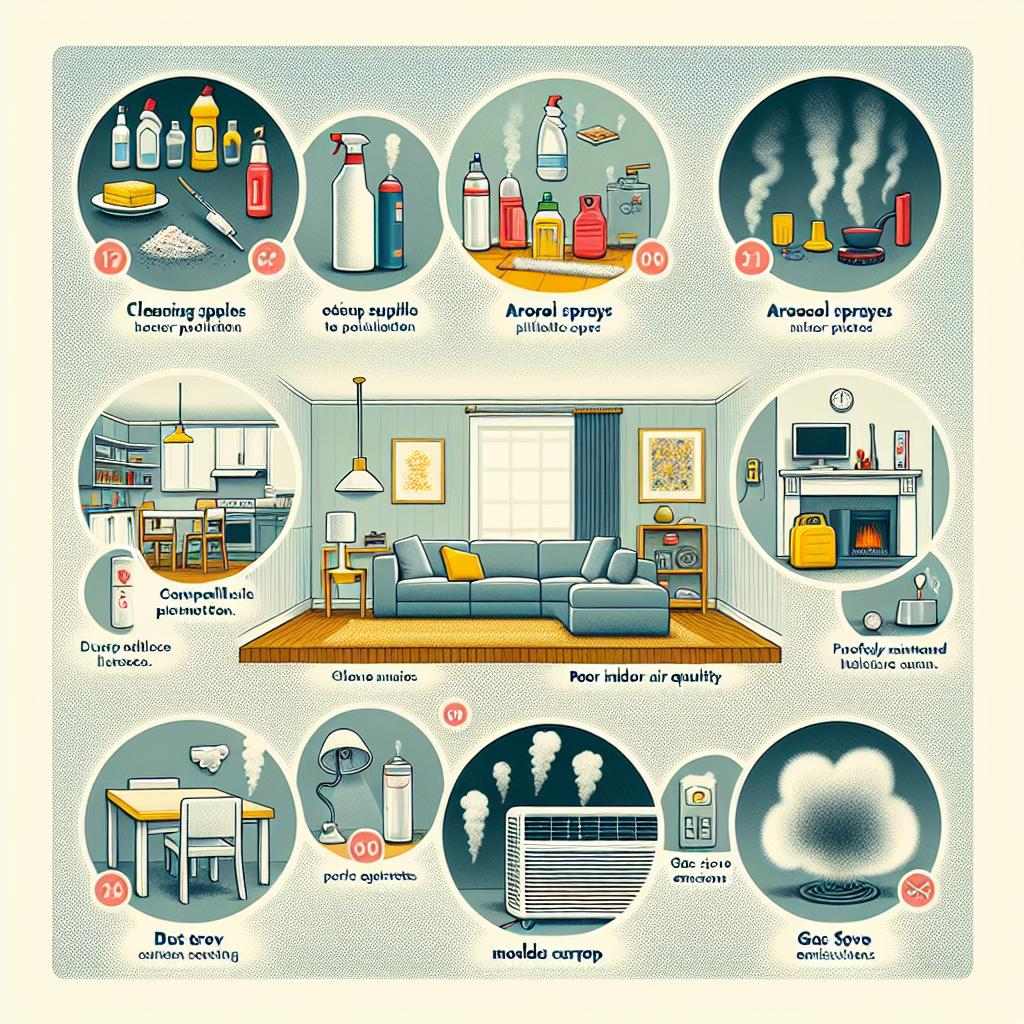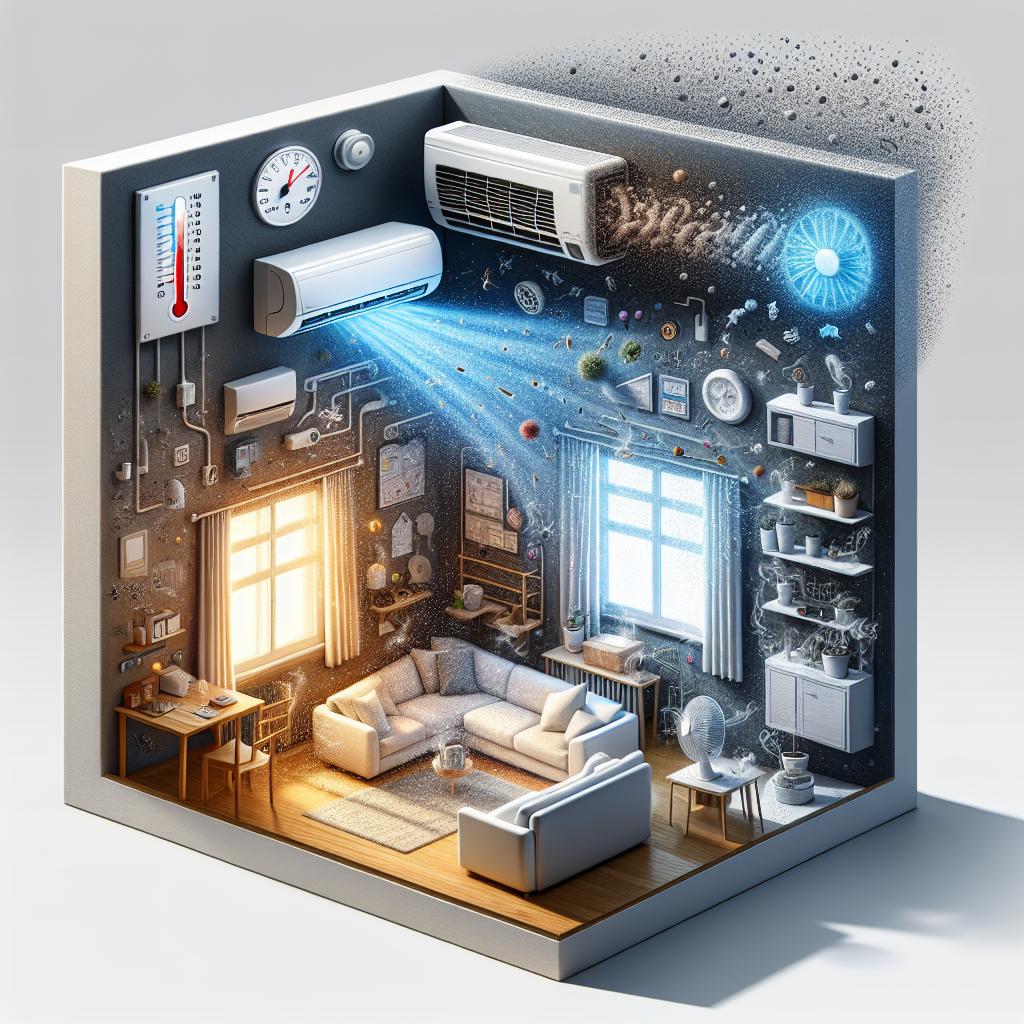Indoor air quality (IAQ) is often an overlooked aspect of commercial spaces, yet it plays a pivotal role in the health, comfort, and productivity of occupants. As businesses strive to create environments that foster creativity and collaboration, the hidden threats posed by poor ventilation, dust, humidity, and volatile organic compounds (VOCs) can undermine these efforts. This article delves into the common indoor air quality issues faced by commercial spaces and explores how they impact mini-split air conditioning systems—an increasingly popular choice for efficient climate control. From the nuanced interplay between air quality and system performance to the long-term implications for both equipment longevity and occupant well-being, understanding these dynamics is essential for creating healthier, more productive workplaces. Join us as we unravel the complexities of indoor air quality and its vital connection to mini-split AC systems in commercial environments.
Identifying Pollutants: Understanding the Sources of Poor Indoor Air Quality
Indoor air pollution sources can significantly impact the quality of the air we breathe, especially in commercial spaces. Understanding the origins of these pollutants is crucial for effective air management. Common contributors include:
- Volatile Organic Compounds (VOCs): Emitted from office supplies, building materials, and cleaning products.
- Indoor Biological Contaminants: Mold, bacteria, and viruses can thrive in poorly maintained environments.
- Pesticides: Chemicals used for pest control can linger in air and dust.
- Tobacco Smoke: A significant source of indoor air pollutants if smoking is allowed on premises.
These pollutants not only degrade indoor air quality but can also strain mini-split AC systems, reducing their efficiency and longevity. To mitigate these impacts, regular maintenance of HVAC systems is essential. Key measures include:
| Maintenance Measure | Impact on Indoor Air Quality |
|---|---|
| Regular Filter Replacement | Reduces dust and allergens |
| Coil Cleaning | Improves airflow and efficiency |
| Duct Inspections | Minimizes dust and mold accumulation |

The Interplay Between Indoor Air Quality and Mini Split AC Efficiency
Indoor air quality (IAQ) significantly affects the performance of mini split AC systems, influencing both their efficiency and lifespan. When the air in commercial spaces is laden with pollutants such as dust, mold, and volatile organic compounds (VOCs), the cooling systems must work harder to maintain a comfortable temperature. This increased demand can lead to higher energy consumption, driving up operational costs. Moreover, if filters are not regularly maintained or replaced, the unit’s performance can diminish, resulting in inadequate cooling, which can further aggravate the air quality issues by circulating unclean air. Identifying and alleviating common sources of indoor pollutants is crucial for optimizing both IAQ and the functionality of mini split systems.
Some of the prevalent indoor air quality concerns include:
- Dust and Allergens: Accumulation of dust can impede airflow, causing the AC unit to struggle.
- Humidity Levels: Excess moisture can foster mold growth, which can be exacerbated by inefficient cooling.
- Inadequate Ventilation: Lack of fresh air intake may lead to a rise in CO2 levels, impacting health and system efficiency.
To illustrate the connection between IAQ and mini split system efficiency, consider the following table:
| Indoor Quality Issue | Impact on AC Efficiency |
|---|---|
| Dust Accumulation | Reduces airflow; increases energy costs |
| Mold Presence | Strains cooling performance; potential health risks |
| High Humidity | Drives excessive cooling demand; less effective cooling |

Mitigating Risks: Strategies for Enhancing Air Quality in Commercial Spaces
To effectively combat the prevalent challenges of indoor air quality in commercial spaces, it’s essential to implement proactive strategies aimed at enhancing the overall environment. Regular maintenance of *mini-split AC systems* is crucial, as these units often serve as the frontline defense against indoor pollutants. Consider the following methods to mitigate risks:
- Routine Filter Changes: Replacing filters consistently can reduce the accumulation of dust, allergens, and pollutants.
- Incorporating Air Purifiers: Adding HEPA air purifiers can significantly reduce contaminants and improve air quality.
- Monitoring Humidity Levels: Keeping humidity between 30-50% helps prevent mold growth, thus protecting air quality.
- Creating a Maintenance Schedule: Scheduled check-ups for HVAC systems can ensure optimal performance and deter air quality degradation.
Furthermore, creating a culture of awareness among employees about the importance of air quality can greatly enhance the effectiveness of implemented strategies. Training staff on the signs of poor air quality and encouraging them to report any concerns can lead to early intervention. Here are some **benefits** of fostering air quality awareness:
| Benefit | Description |
|---|---|
| Improved Health | Reducing airborne pollutants leads to fewer respiratory issues. |
| Enhanced Productivity | A healthier environment boosts employee focus and performance. |
| Cost Savings | Preventive maintenance can reduce energy costs and equipment failure. |
Maintenance Matters: Best Practices for Optimizing Mini Split Performance
To ensure optimal performance of mini split systems, regular maintenance is essential. Start by cleaning or replacing filters every month. Clogged filters can drastically reduce airflow, causing the system to work harder and leading to increased energy bills. Additionally, it’s important to check and clean the outdoor unit, ensuring that it’s free of debris such as leaves and dirt, which can inhibit its efficiency. A simple visual inspection once a month can prevent more significant issues down the road.
Another crucial aspect is to schedule an annual professional service. Technicians can perform detailed checks on the refrigerant levels, inspect electrical components, and ensure that the system is operating at peak efficiency. Keeping drainage lines clear is also vital in preventing mold and mildew, which contribute to poor indoor air quality. Following these best practices not only enhances performance but also prolongs the life of your mini split system.
Q&A
Q&A: Common Indoor Air Quality Issues in Commercial Spaces and Their Impact on Mini Split AC
Q1: What are the most prevalent indoor air quality issues found in commercial spaces?
A1: In commercial spaces, several indoor air quality (IAQ) issues can arise, including poor ventilation, excessive humidity, and the presence of allergens or pollutants such as dust, mold, and volatile organic compounds (VOCs). Additionally, issues related to insufficient air filtration or outdated HVAC systems can exacerbate these problems, leading to uncomfortable or unhealthy environments for employees and customers alike.
Q2: How does poor indoor air quality affect the operation of mini split AC systems?
A2: Mini split AC systems are designed to provide efficient heating and cooling while maintaining air quality. However, when indoor air quality is compromised—whether due to excessive dust, humidity, or contaminants—it can hinder the performance of these systems. Clogged air filters and evaporator coils can develop, reducing efficiency and increasing energy consumption. Moreover, unaddressed humidity issues can lead to condensation, potentially causing water damage or fostering mold growth.
Q3: Can poor indoor air quality contribute to health issues in commercial spaces?
A3: Yes, indeed! Poor indoor air quality can lead to a variety of health problems for occupants, including respiratory issues, headaches, fatigue, and exacerbation of allergies or asthma. Studies have shown that employees working in environments with compromised air quality can experience lower productivity levels and higher absenteeism rates. Addressing IAQ becomes essential not only for occupant health but also for overall workplace performance.
Q4: What role does ventilation play in improving indoor air quality?
A4: Ventilation is crucial for maintaining good indoor air quality, especially in commercial spaces with high occupancy or specific activities that generate pollutants. Proper ventilation helps to reduce indoor pollutant levels by introducing fresh, outdoor air while expelling stale, contaminated air. By integrating adequate ventilation with mini split AC systems, businesses can significantly enhance air quality, ensuring a healthier work environment.
Q5: How can businesses maintain a healthy indoor environment while using mini split AC systems?
A5: To maintain a healthy indoor environment while using mini split AC systems, businesses should regularly change or clean air filters, schedule routine maintenance for the units, and ensure that all ventilation systems are functioning properly. Implementing a monitor for humidity levels and utilizing dehumidifiers when necessary can prevent moisture-related issues. Additionally, promoting good housekeeping practices can help reduce dust and allergen buildup, enhancing overall air quality.
Q6: What are the long-term benefits of addressing indoor air quality issues in relation to mini split AC systems?
A6: Addressing indoor air quality issues can yield considerable long-term benefits, including increased energy efficiency, reduced operational costs, and enhanced employee health and productivity. When properly maintained, mini split AC systems can function optimally, leading to lower energy bills and a longer lifespan for the unit. Ultimately, investing in improved IAQ creates a more comfortable workplace, fostering a positive culture and boosting employee morale.
Q7: What steps should businesses take if they suspect indoor air quality problems?
A7: If businesses suspect they have indoor air quality problems, they should first conduct a thorough assessment to identify potential sources of pollution. This might include hiring professionals for air quality testing. Once issues are identified, implementing solutions such as upgrading air filtration systems, improving ventilation, and creating a cleaning schedule can be beneficial. Engaging employees in awareness programs about the importance of air quality can also lead to collaborative efforts in maintaining a healthier indoor environment.
By taking proactive steps, businesses can enhance their indoor air quality and optimize the functioning of their mini split AC systems, creating a better workplace for everyone involved.
Closing Remarks
addressing indoor air quality issues in commercial spaces is not just a matter of comfort; it’s a pivotal factor in ensuring the longevity and efficiency of mini split air conditioning systems. As we’ve explored, contaminants such as dust, mold, and volatile organic compounds can take a toll not only on the health of occupants but also on the operational efficacy of these systems.
By prioritizing regular maintenance and implementing effective air quality management strategies, businesses can create a healthier environment while simultaneously enhancing the performance of their HVAC solutions. As the demand for energy-efficient climate control systems continues to grow, understanding the interplay between indoor air quality and mini split systems becomes increasingly essential.
Ultimately, fostering a sustainable and safe workspace is a collective responsibility—one that involves both proactive measures and ongoing education about the significance of clean air. As you reflect on the insights shared in this article, consider how they might spark a change in your own commercial space. After all, a breath of fresh air is invaluable—not just for productivity, but for the well-being of everyone inside.

